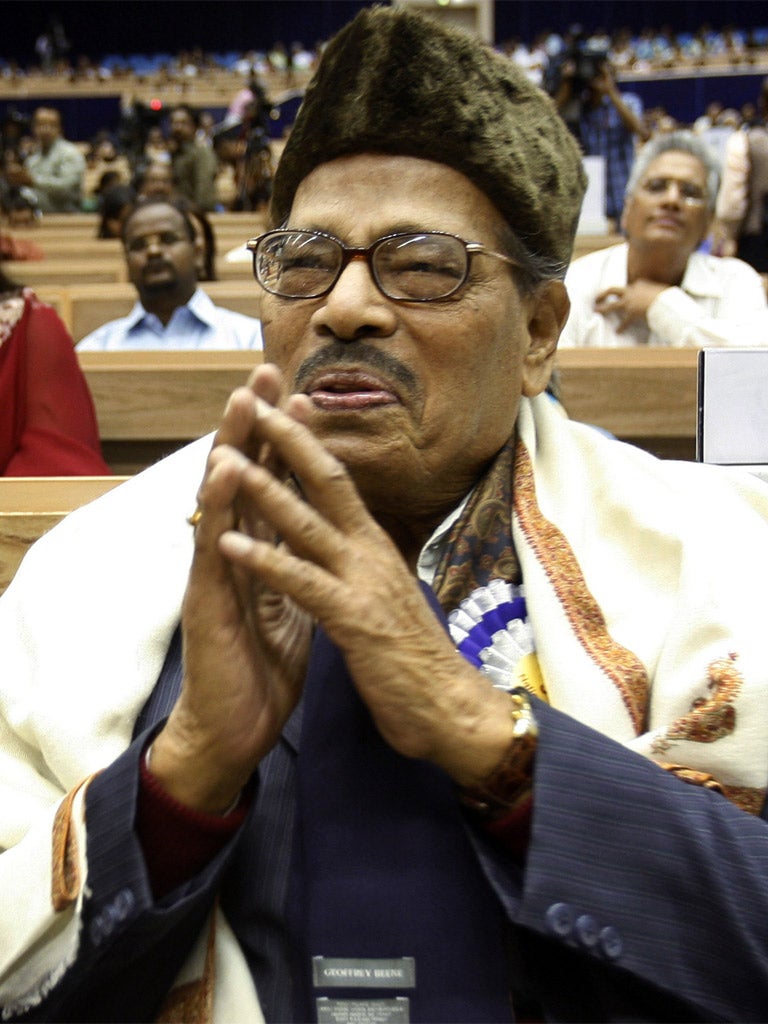Your support helps us to tell the story
From reproductive rights to climate change to Big Tech, The Independent is on the ground when the story is developing. Whether it's investigating the financials of Elon Musk's pro-Trump PAC or producing our latest documentary, 'The A Word', which shines a light on the American women fighting for reproductive rights, we know how important it is to parse out the facts from the messaging.
At such a critical moment in US history, we need reporters on the ground. Your donation allows us to keep sending journalists to speak to both sides of the story.
The Independent is trusted by Americans across the entire political spectrum. And unlike many other quality news outlets, we choose not to lock Americans out of our reporting and analysis with paywalls. We believe quality journalism should be available to everyone, paid for by those who can afford it.
Your support makes all the difference.Alongside Kishore Kumar, Mukesh and Mohammad Rafi, Manna Dey, was part of the Bombay-based film industry's pantheon of male playback singers to emerge in the 1950s. Over the course of the next two decades they and female counterparts like Asha Bhosle and Lata Mangeshkar helped create a popular-culture phenomenon. A film industry with greater cultural penetration even than Hollywood, Bollywood crossed the globe with the Indian diaspora. A major factor in its international popularity was its songs.
Born to Mahamaya and her husband Purna Chandra Dey, Prabodh Chandra Dey was Bengali, like a disproportionate number of the Bombay industry's senior music-makers. He began working in the early 1940s, having accompanied his "kaka", or paternal uncle, the composer KC Dey, when he visited Bombay. Initially working as second assistant to his uncle, he furthered his apprenticeship in film by moving on to work with the Bengali music director Sachin Dev Burman, one of the greatest talents in town.
He gained experience with other music directors and learned his way around a studio session, a grounding from the bottom up that stood him in good stead. He continued to study Hindustani vocal music with Ustad ["master", the Muslim equivalent of the Hindu term "pandit"] Aman Ali Khan and Ustad Abdul Rahman Khan. This classical training underpinned and informed his singing.
He was launched as a playback singer in 1942 and built a reputation as a consummate vocalist. Much in demand, he chose to stay in Bombay after Partition, his vocal versatility, especially when classically based material was called for, singling him out as a special talent. He also began composing, a logical progression, though not one that every major playback singer took.
Schooled in Hindustani and Bengali art music forms – in the latter case the songs of, for example, Rabindranath Tagore – Dey had an innate and instinctive facility for raag-based popular song. Unlike most classical vocalists his professionalism meant he could be trusted to distil and deliver the essence of a classically based composition without any prima donna antics while the studio session clock was ticking.
His combination of stylistic versatility and wobble-free vocal steadiness made him a prized asset. When the Shankar-Jaikishan writing team wanted two singers to duet on the classically inflected "Ketaki Gulab Juhi" for Basant Bahar (1956), a film given a raag's name, Dey was the logical and probably only choice to sing with the great classicist, Pandit Bhimsen Joshi.
His hallmark was that sheer versatility. While there is an understandable tendency to highlight his classical vocal artistry, he was the great all-rounder of the Golden Age of Bombay cinema and had a greater longevity and diversity than his male compeers. His gift for light-hearted and romantic song was extraordinary, yet as his duet with Kishore Kumar on the Hindi-language "Babu Samjho Ishare", an SD Burman composition from Chalti Ka Nam Gaadi (1958), showed, he and Kumar revealed a mastery of comedic timing, western or westernised elements and meshing voices together for maximum effect.
The competition was cut-throat. In the notes to the 87-track, five-CD Legends – Manna Dey – The Maestro (2000) boxed set, he observed that "There were only a limited number of songs to render. So if a hero wanted Rafi Sahab [Mohammad Rafi], naturally it had to be Rafi. Then if it was [actor] Dilip Kumar who was a soft-spoken man, he would prefer [playback singer] Talat Mahmood. [Actor] Raj Kumar always wanted Mukesh."
Nevertheless the much-fêted Dey recorded over 3,000 songs in a variety of styles and languages. As well as Hindi and or Bengali popular song, he worked in Assamese, Gujarati, Marathi, Punjabi and an assortment of other tongues, and in devotional and light classical poetic song forms. For the last decade of his career, between 1992 and 2012, he focussed on concert performance, his last major appearance being in Mumbai in 2012.
Prabodh Chandra "Manna" Dey, singer and composer: born Calcutta, Bengal, British India 1 May 1919; married 1953 Sulochana Kumaran (died 2012; two daughters); died Bangalore 24 October 2013.

Join our commenting forum
Join thought-provoking conversations, follow other Independent readers and see their replies
Comments